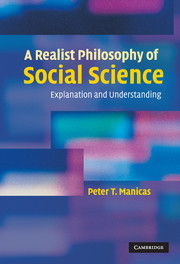Book contents
- Frontmatter
- Contents
- Acknowledgements
- Introduction
- 1 Explanation and understanding
- 2 Theory, experiment and the metaphysics of Laplace
- 3 Explanation and understanding in the social sciences
- 4 Agents and generative social mechanisms
- 5 Social science and history
- 6 Markets as social mechanisms
- Appendix A The limits of multiple regression
- Appendix B Comparison, Mill's methods and narrative
- Appendix C Rational choice theory and historical sociology
- Appendix D The neo-classical model
- References
- Index
3 - Explanation and understanding in the social sciences
Published online by Cambridge University Press: 12 November 2009
- Frontmatter
- Contents
- Acknowledgements
- Introduction
- 1 Explanation and understanding
- 2 Theory, experiment and the metaphysics of Laplace
- 3 Explanation and understanding in the social sciences
- 4 Agents and generative social mechanisms
- 5 Social science and history
- 6 Markets as social mechanisms
- Appendix A The limits of multiple regression
- Appendix B Comparison, Mill's methods and narrative
- Appendix C Rational choice theory and historical sociology
- Appendix D The neo-classical model
- References
- Index
Summary
Introduction
It is often supposed that because the social sciences must deal with people, social science is either quite impossible, or at best, inevitably incompetent. Unfortunately, this view is promoted, in quite unintended ways, by many writers who have a mistaken view of the natural sciences. These writers suppose that:
If science is to be empirical, it must be experimental.
The main task of science is prediction.
The successful sciences can both explain and predict events (including, then, the acts of individuals).
Nature is uniform in the sense that scientific laws are regularities of the form, “whenever this, then that.”
Theories are “deductive systems.”
Scientific observation is theory-neutral.
If we measure the social sciences on any of these grounds, they look very bad – even hopeless. But things are not as bad as they seem, since none of the foregoing propositions is true. In the previous chapters, we tried to show why. The alternative offered shows that:
There are very successful non-experimental sciences.
A main task of any science is description and understanding; prediction plays a minor role.
Explaining concrete events is generally neither the interest, nor often within the competence, of a science.
Nature is uniform not in the sense that there are “invariant relations of resemblance and succession” (regularity determinism), but in the sense that things have causal powers that allow us to generalize and have expectations.
Theories are almost never deductive systems; rather, they offer a representation of causal mechanisms and processes, both observable and non-observable.
Finally, it is quite impossible to “observe” anything independently of some conceptual frame of reference, but this does not undermine the quest for a true representation of reality.
- Type
- Chapter
- Information
- A Realist Philosophy of Social ScienceExplanation and Understanding, pp. 42 - 74Publisher: Cambridge University PressPrint publication year: 2006

